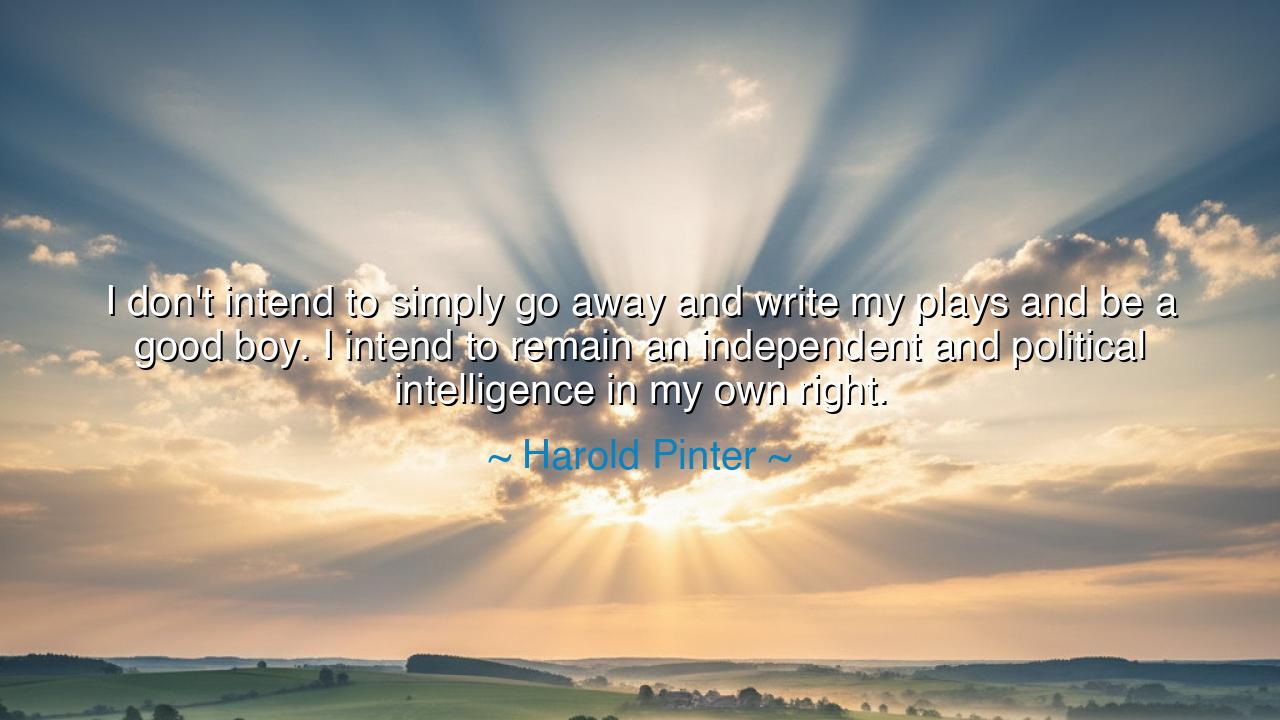
I don't intend to simply go away and write my plays and be a good
I don't intend to simply go away and write my plays and be a good boy. I intend to remain an independent and political intelligence in my own right.






The words “I don’t intend to simply go away and write my plays and be a good boy. I intend to remain an independent and political intelligence in my own right,” were spoken by Harold Pinter, the great British playwright whose pen carved silence into speech and turned speech into revelation. These are not the words of a man content with applause or comfort—they are the cry of a thinker who refuses to be tamed by expectation. In this defiant declaration, Pinter stands as one of the last torchbearers of the artist as conscience, proclaiming that true creation cannot exist apart from moral and political awakening. He declares independence not only of thought, but of spirit, affirming that the artist’s duty is to confront power, to speak truth, and to remain unbought by the world’s temptations.
In the time Pinter spoke these words, he was already a celebrated dramatist—winner of the Nobel Prize in Literature, author of plays like The Birthday Party and The Homecoming, master of the famous “Pinter pause,” that pregnant silence where meaning breathes. Yet fame was never his end. The world expected him to fade quietly into art, to write beautiful lines and live within the safe boundaries of the theatre. But Pinter, ever the insurgent of intellect, refused. He saw how art, when stripped of political courage, becomes decoration. He believed that the playwright must not merely entertain, but awaken—that the artist must walk among the living, not hide among the pages of his work. His statement, therefore, is a vow to remain alive, active, and unyielding, to challenge authority, and to use the gift of words not as escape, but as weapon.
To call oneself an “independent and political intelligence” is to claim the most dangerous kind of freedom. For Pinter, independence meant liberation not only from institutions, but from fear—the fear of being misunderstood, condemned, or silenced. He spoke against the wars of his time, criticized imperial hypocrisy, and denounced the false sanctity of governments that claimed virtue while practicing oppression. Like the prophets of old, he was unafraid to stand alone. His voice echoed that of Socrates, who in ancient Athens refused to abandon the pursuit of truth even when condemned by his city. Both men understood that intelligence without conscience is cunning, and conscience without independence is slavery.
Pinter’s defiance reminds us that art and politics are not strangers, but twin forces born from the same soil of humanity. In ages past, the poet and the prophet were one—the guardians of a people’s moral imagination. Dante wrote The Divine Comedy not merely to chart the afterlife, but to indict the corruption of his own time. Shakespeare, beneath his kings and jesters, exposed the lust for power and the fragility of justice. Pinter walks in their footsteps, reminding us that the artist who withdraws into neutrality betrays his own gift. To create without conviction is to speak in a dream while the world burns.
And yet, his words reach beyond the stage. They speak to all who labor in the shadow of authority, to every soul tempted to trade integrity for comfort. To be independent in thought and political in spirit is to live with one’s eyes open, to resist being lulled by the noise of conformity. It means asking questions even when answers offend, defending the truth even when truth wounds. In a world that often rewards obedience, Pinter calls us to courage—the courage to think freely, to stand alone if need be, and to act according to conscience rather than convenience.
Let us remember, too, that such independence is not isolation. The independent intelligence is not one who rejects community, but one who strengthens it by refusing falsehood. The political mind, when guided by compassion, becomes a beacon for others. Pinter’s life shows us that rebellion, when born of love for justice, becomes service; that resistance, when guided by clarity, becomes art. He teaches us that the greatest loyalty is not to power, but to truth—and that truth itself is the highest form of art.
So, O seeker of wisdom, take Harold Pinter’s words as a sacred charge. Do not retreat from the world to please it. Whether you write, teach, lead, or build, let your work carry the pulse of conscience. Question every easy answer. Speak when silence becomes complicity. And above all, guard your independence as the soul guards its breath—for it is through independent minds that civilizations awaken.
For as Pinter reminds us, the artist—and indeed every thinking being—must not be a “good boy” in the eyes of authority, but a good soul in the eyes of eternity. To remain an independent and political intelligence is to live fully awake, to think deeply, and to act bravely—for only such lives keep the light of truth alive in a darkening world.






AAdministratorAdministrator
Welcome, honored guests. Please leave a comment, we will respond soon